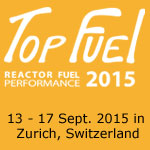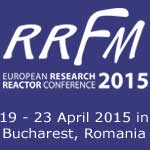
ENS NEWS N° 45: Learning the lessons of RioI was recently in Budapest for an international nuclear conference that was attended by senior government and EU officials, representatives of the nuclear industry and other stakeholders. It focused on the current state and future direction of the nuclear industry in Europe, on EU energy policy in general – and nuclear in particular – and on the latest reactor technology in support of global new build. The importance of the agenda and the stature of the speakers present, which included ENS Secretary General, Jean-Pol Poncelet, were matched only by the keen interest shown by delegates in a global phenomenon that is currently sweeping the world. No, it’s not nuclear new build, but a sporting event that generates commercial and media interest of gigantic proportions; an event that fires the imagination, stirs the passion and involves sums of money that make your eyes water. Well, unless you have spent the past couple of weeks on a penal colony on Venus, you can’t have failed to notice that the 2014 FIFA Football World Cup has been monopolising the world’s TV channels, dominating the media and preoccupying the waking hours of millions of football addicts around the world. I am reliably informed that this sporting extravaganza, with its iconic pictures of the Copacabana Beach, the Sugar Loaf Mountain and the Corcovado, is even popular with people who don’t usually follow football. Well, whether the World Cup is a passion for you, or whether you prefer to watch grass grow – yes, believe it or not there are people who are not gripped by football fever – you cannot deny that this mega event has to a large extent taken over the collective consciousness of the planet. Marx famously remarked that ‘religion is the opium of the people.’ Well, he never got to see the World Cup. You could be forgiven, in all the media frenzy surrounding the competition, for temporarily losing sight of the importance of the recent European Parliament elections and the nomination of a new EC President. Voter apathy and a general lack of interest in the Machiavellian arts made sure that the latter event was never likely to compete with the former, at least for a majority of European citizens. To be fair, what chance did the new Assembly have to really make its presence felt when the eyes of the world were firmly fixed on Rio de Janeiro, Sao Paolo and Belo Horizonte? If truth be told, many MEPs are probably at least as interested in watching the matches on a giant screen as they are in campaigning for election to a committee or getting to know their new electorate. And yet these political events cannot be dismissed as mere bagatelles. Indeed, they may well have an impact, subtle or otherwise, on the future direction of nuclear energy policy, or on how funding and support for research is allocated and managed. We shall see. Will a new ITRE (Industry Research and Energy) Committee in the European Parliament pursue a slightly different agenda to that of its predecessor? Who will be the next Research Commissioner, and what are likely to be his or her priorities? These are legitimate questions. Of course, the change might be minimal. But, long after the memory of the great goals and inept refereeing performances has faded away, and we have been weaned off the drug of football, even a small degree of political change could influence the framework within which the nuclear science community will be expected to work in the future. I was amazed and amused during the conference in Budapest to see how many speakers suddenly started using footballing analogies and expressions in their presentations. They really grabbed participants’ attention. This new populist vernacular was a godsend for emphasising points and highlighting issues with a splash of colour and humour. All of a sudden, utilities were told to ‘keep their eyes on the ball’. Governments were urged to create ‘a level playing field’ for nuclear, to avoid ‘scoring an own goal’ by failing to acknowledge its many virtues. ‘Defence in depth’ became a principle shared not only by nuclear power plants, but also by well organised defensive-minded teams. The conference was a great success, thanks largely to the quality of speakers and diversity of the programme. Rather than being a distraction, the World Cup actually added something to the proceedings; something that it was difficult to quantify or define, but something tangible none the less. As the participants left at the end of the conference to catch their planes home or to book a place in the local pub for the next round of matches, I couldn’t help being struck by how much something can unite people, trigger emotion and involvement and focus the mind. Ironically, nuclear energy only tends to provoke such an emotional response, or such blind devotion among those who already oppose it. Perhaps there is something we can learn from this global football festival when it comes to speaking to people on their terms, in a language that is universal, comprehensible, appealing and relevant to their lives. Using emotion to articulate key messages is not a skill that the nuclear community is particularly renowned for, but surely it’s never too late to learn new skills?
|
||
Word from the PresidentSince my last letter, we held our European Nuclear Conference (ENC 2014) in Marseille, from 12 to 15 May. I apologize to those readers who attended the conference and who will already have read my words, but let me recall what I said in the conference brochure. |
||
ENC 2014: Where Europe’s nuclear science and industry community gets togetherThe European Nuclear Conference (ENC 2014) took place in Marseille, from 11 – 14 May. This flagship ENS conference provides a shop window for the whole nuclear community to showcase the research that is being carried worldwide into the many varied applications of nuclear technology. |
||
ENC 2014: Day 2 Plenary session: the many applications of nuclear technologyMany citizens probably know little about the many non-electricity-generation applications of nuclear technology. They probably aren’t very aware of just how much nuclear technology is part of their everyday lives. |
||
TopFuel 201513 - 17 September 2015 in Zurich, SwitzerlandCall for PapersTopFuel’s primary objective is to bring together leading specialists in the field from around the world to analyse advances in nuclear fuel management technology and to use the findings of the latest cutting-edge research to help manufacture the high performance nuclear fuels of today and tomorrow. |
||
RRFM 201519 - 23 April 2014 in Bucharest, RomaniaCall for PapersIn 2015 the European Research Reactor Conference, RRFM, will take place in Bucharest, Romania. The conference programme will revolve around a series of plenary sessions dedicated to the latest global developments with regards to research reactor technology and management. |


